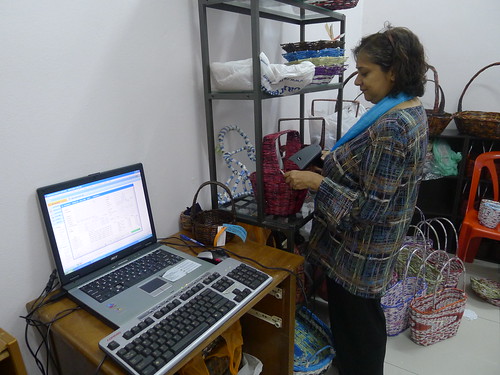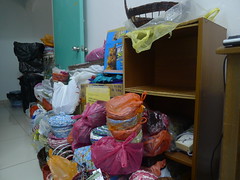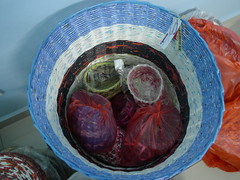Chong Sheau Ching launched the Salaam Wanita eco-basket project over 7 years ago with the vision of helping women work from home in other ways than using a computer to start e-businesses.
What she didn’t know then was that this project would expand rapidly requiring an office and a full-time eco-basket administrator. Today the eHomemakers office is home to an inventory room full of baskets and weavers stop by each week for trainings or to drop off orders. Two technical staff members work part-time from home to manage the “justmarketing” website to promote the baskets to international buyers.
Locally, the baskets are still sold primarily during school sales, fairs, and holiday bazaars. The sale opportunities vary each month depending on the holidays and whether eH is able to negotiate a free or highly discounted table. If eH pays full-price for a table they risk losing money if the basket sales aren’t strong. Fair and festival organizers can give projected attendance numbers based on previous years, but whether the buyers are interested in purchasing the baskets cannot be guaranteed.
Volunteering with eH has given me the opportunity to participate in the intricate process of preparing to sell baskets at a festival.
Step 1: The eco-basket coordinator must keep a calendar of all the upcoming local fairs and festivals that provide good opportunities for basket sales. The coordinator reaches out to the organizers and requests a free or discounted table at least a month in advance.
Step 2: Once a table has been confirmed, the eco-basket coordinator needs to find volunteers to staff the table. A culture of volunteerism isn’t established in Malaysia, making it harder to find people willing to spend a day staffing the eco-basket table for free. In addition, the volunteer must be willing to come to the eH office to pick up all the baskets, promotional brochures, and materials needed for the fair. eH has very limited funds and resources, so the volunteers must be willing to buy their own lunch and pay for gas and parking as required.
At the end of the day or after the weekend, the volunteers are responsible for returning everything. eH must also be sure that they can trust whoever is volunteering to protect and return the money that is earned from the basket sales.
It usually requires several text messages and phone calls before dependable and willing volunteers can be identified.
Step 3: A few days before the fair, the eco-baskets that will be sold must be pulled from the inventory. In the past 2 months, eH started using a bar coding system. Each basket that will be removed from the inventory room needs to be scanned. Depending on the size of the table and the number of volunteers available, anywhere from 50 to 90 different baskets will be selected and scanned for the fair.
Step 4: After the baskets are scanned, each one must be wrapped in a plastic bag to prevent it from being damaged or scratching other baskets when they are packed together. eH collects and reuses plastic bags for this purpose. (If the bags are dirty, a volunteer will wash and dry the bags. Then they are folded into compact triangles and kept in boxes according to size.)
Step 5: Smaller baskets are stored in larger baskets to make them easier to transport. They are brought downstairs and put close to the door so they can be easily moved outside.
Step 6: Before or on the actual day of the bazaar, the volunteer will arrive and an eH staff will help that person place the baskets, cash box, and other materials in the car.
Step 7: The volunteer(s) sit at the eH table and try to sell the baskets to potential buyers! Other handicraft vendors will be present, so the Salaam Wanita eco-baskets must be distinguished from the competition with the personal stories of the women who made them. As one might expect, on some days the sales prove to be more successful than others.
Steps 8, 9, 10…: The volunteer returns all the materials to the office. All of the baskets are taken out of the plastic bags, the bags are folded and stored according to size, the unsold baskets are scanned back into the inventory system and put back into their proper storage place, orders are placed with available weavers for more of the top-selling baskets, and the sales money is taken to the bank for deposit.
The process of preparing and restocking the baskets for a one-day event where the sales are not guaranteed is very time consuming. Moving forward, eH hopes to secure partnerships with international wholesalers and corporations for bigger orders and more consistent income for the weavers.
Posted By Maria Skouras
Posted Apr 13th, 2011




